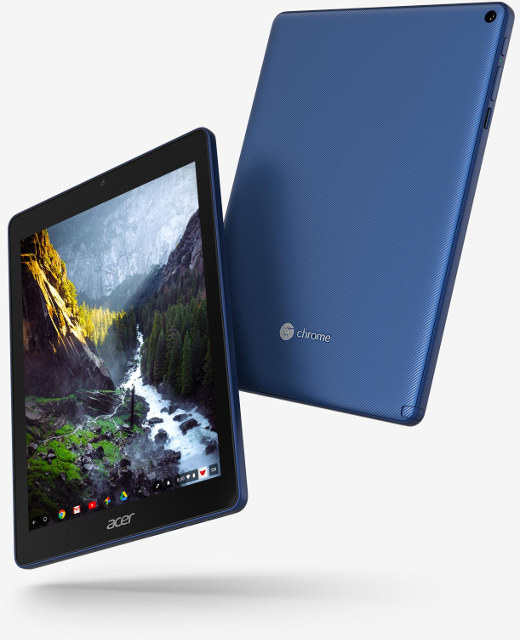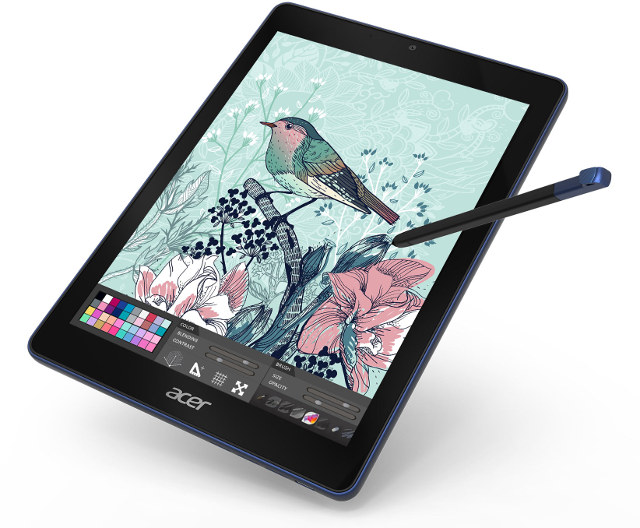Chrome OS has been found in laptops (Chromebooks), and mini PCs (Chromeboxes) or even All-in-One PCs (Chromebases) for a while, but a new category has launched with Chrome OS tablets starting with Acer Chromebook Tab 10.
The tablet is powered by a Rockchip RK3399 / OP1 processor, comes with 4GB RAM and 32GB storage, a 9.7″ display, supports Wacom EMR stylus, targets the education market.

Acer Chromebook Tab 10 (D651N) specifications:
- SoC – Rockchip RK3399-C / OP1 hexa core processor with two Cortex A72 cores, four Cortex A53 cores, and a Mali-T860MP4 GPU
- System Memory – 4GB RAM
- Storage – 32GB eMMC flash, micro SD card slot
- Display – 9.7″ touchscreen IPS display with QXGA (2048×1536) resolution
- Audio – Headphone/speaker jack
- Connectivity – 802.11ac 2×2 MIMO WiFi, Bluetooth 4.2
- Camera – 2MP front-facing camera
- USB – 1x USB 3.1 Gen 1 Type C port for charging, data transfer and connection to an HD display
- Battery – Up to 9 hours on a charge
- Dimensions – 238.2 x 172.2 x 9.98 mm
- Weight – 550 grams

The Wacom EMR stylus will allow students to work precisely with interactive apps, sketch, take notes and so son.
Acer Chromebook Tab 10 will starting in North America in April for $329 and up, before the EMEA launch in May with prices starting at €329 including VAT. You may find further details in the product page.

Jean-Luc started CNX Software in 2010 as a part-time endeavor, before quitting his job as a software engineering manager, and starting to write daily news, and reviews full time later in 2011.
Support CNX Software! Donate via cryptocurrencies, become a Patron on Patreon, or purchase goods on Amazon or Aliexpress





I thought the road forward was Android, not Chrome OS?
Does this really matter? All your personal data ends up collected by Google anyway: https://twitter.com/iamdylancurran/status/977559925680467968
*R2D2 whistle*
A good one! Hence i’ve started to move stuff away from such “track everything, no privacy” service providers and started myself service based on ownCloud/Nextcloud.
Well, I could relive a trip I made three years ago….
Google kept track of all places I walked with more or less accuracy.
I’m not using Cellular data though, so people on 3G/LTE may be tracked more accurately. That means the phone kept that data, and sync’ed it once I was back at the hotel with WiFi.
I appears that the location data was discarded the days I had no access to WiFi.
Read this quartz article: https://qz.com/1131515/google-collects-android-users-locations-even-when-location-services-are-disabled/
you may also want to read this: https://qz.com/1183559/if-youre-using-an-android-phone-google-may-be-tracking-every-move-you-make/
I’m also reluctant to use google’s dns services. No idea what is recorded there.
Then again I guess they already know I am a regular visitor of cnx -software 🙂
> I’m also reluctant to use google’s dns services. No idea what is recorded there.
Everything of course. And since all DNS requests happen timely it even allows cross-device tracking (you using your smartphone at home and your computer and allowing Google to learn that both are used in the same household). What you do on the internet they already know (Google AMP, ajax.google.com, fonts.google.com and so on –almost every web site out there loads ressources from Google in the meantime to provide best tracking experience ever). But by using their DNS combined with other geolocation tracking methods they also know who does what with whom and where.
Hahaha, CNX is guilty here as well… oops
It’s kinda astonishing what percent of websites end up making you fetch from Google. For some reason most people in tech aren’t really aware of this – we have the Facebook freakout instead 😛
Funny enough China for all the annoyances of the Great Firewall has created a bit of bastion from Google’s tentacles – both in web and in their Android devices. Living in China I see that year to year more websites are broken so I think the tentacles are going further and deeper. I’ve found ways to block all of google – not really out of privacy concerns, but mostly so I don’t have to wait for the JS loads to time out – but do you know of any way to have the system redirect to other hosts or to maintain a local cache of the data? I’ve been looking for a good solution for ages…
It’s trivial for websites to make JS fallbacks to other hosts, but no one does it (StackOverflow is my main headache here). It’d be nice if the web was a bit less broken for us here in the people’s paradise 🙂
Maintaining a local cache of data is a bit done in your browser. If you want to take that further you need to install and use a caching proxy server.
For redirecting to other hosts:
Redirecting a domain to a different IP address is fairly simple. Just add an entry in your hosts file. (in /etc/hosts on linux or somewhere in your system folder under windows).
This is a mechanism used by some ad blockers.
You can also redirect to 127.0.0.1 if you want to.
If you want to map an IP address to a different IP address you probably need some iptables magic in your router, (and if you are really serious about protection have a look at pfsense).
(and apologies for deviating a bit from the topic at hand)
Thanks for the suggestions. I see how it’s technically possible with iptables and /etc/hosts – but it’s not practical to manually find alternatives to all the Google javascript/fonts/whatever all on your own (and to maintain it!). I’m just surprised it hasn’t been done before in some kind of organized effort
I can always do VPN – but it’s a bit of a dirtier solution. They’re also usually flaky and Linux support is nonexistant (OpenVPN doesn’t work in China)
I guess the perfect solution would be a router solution (with OpenWRT or something like that). I might try to look around their forums if anyone knows of a good solution
Actually I’m wondering that they could use that info to correlate requests over VPN to your person. Might well be that this is possible (of course the request need to end up at their site)
Just read through FransM’s articles. Google products record:
* The MAC address, signal strength, and frequency of every nearby wifi access point
* The MAC address, identifier, type, and two measures of signal strength of every nearby Bluetooth beacon
In urban areas you get tracked even more precisely compared to cell tower triangulation.
The Chrome OS should have android compatibility layer on it.
I am waiting for Chrome OS tablets from Chinese manufacturers. Hoepfully, they will release some tablets this year.
I’ll buy if I can install regular Linux, the rk3399 already has good kernel support so hopefully Acer hasn’t locked it down too much
Since it’s based on RK339,9, could there a chance to boot Linux on it from sd-card or something?